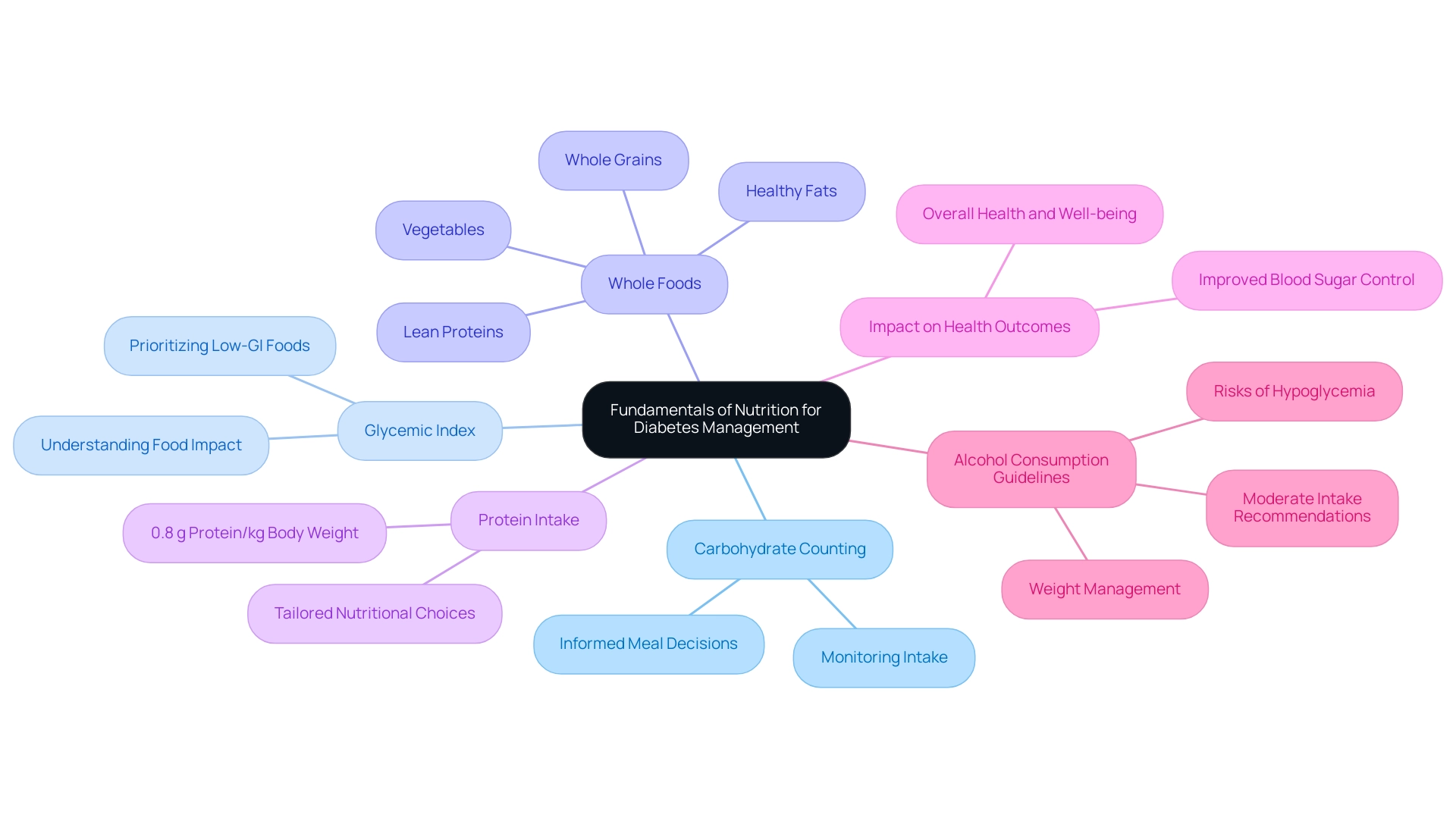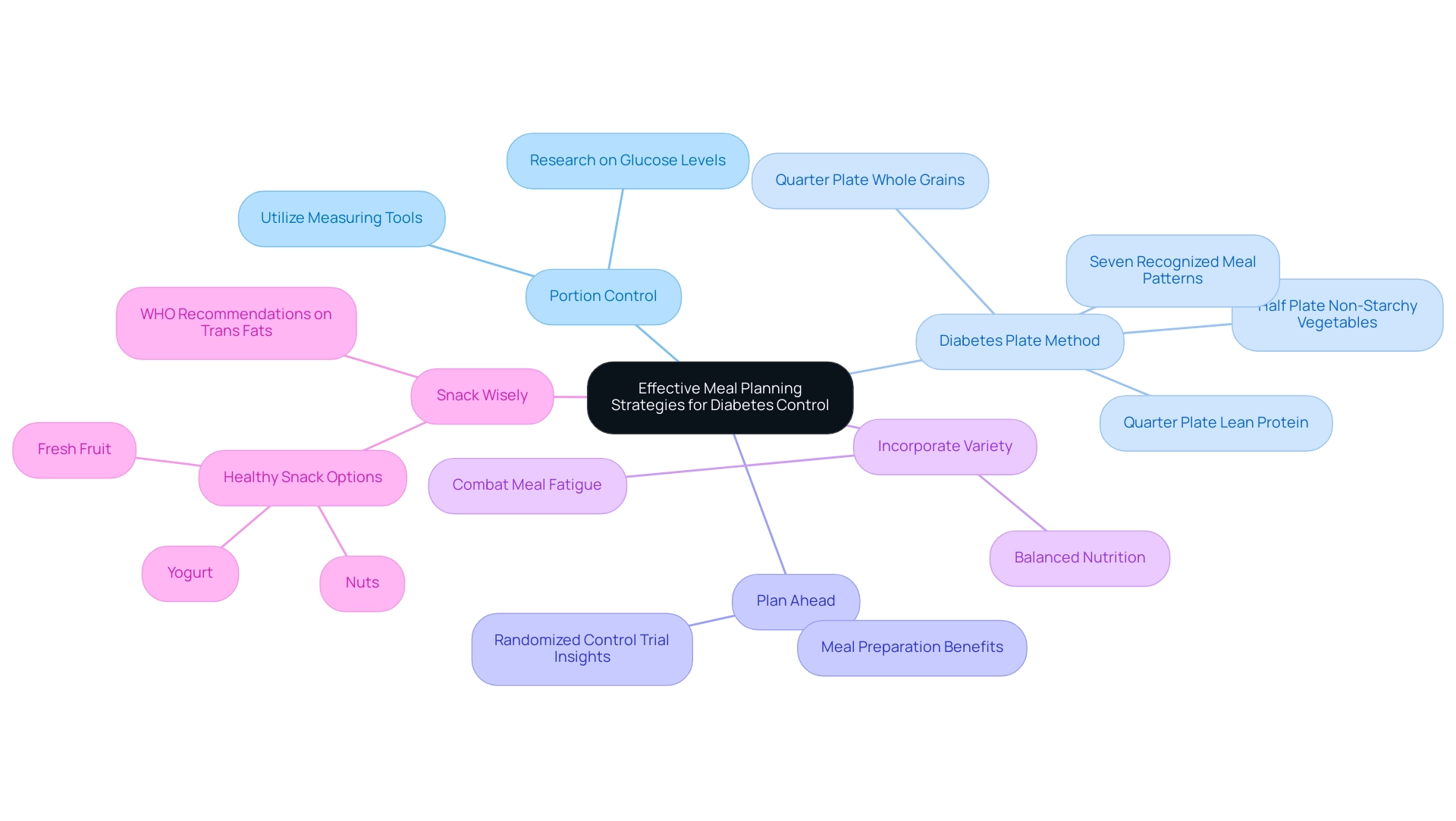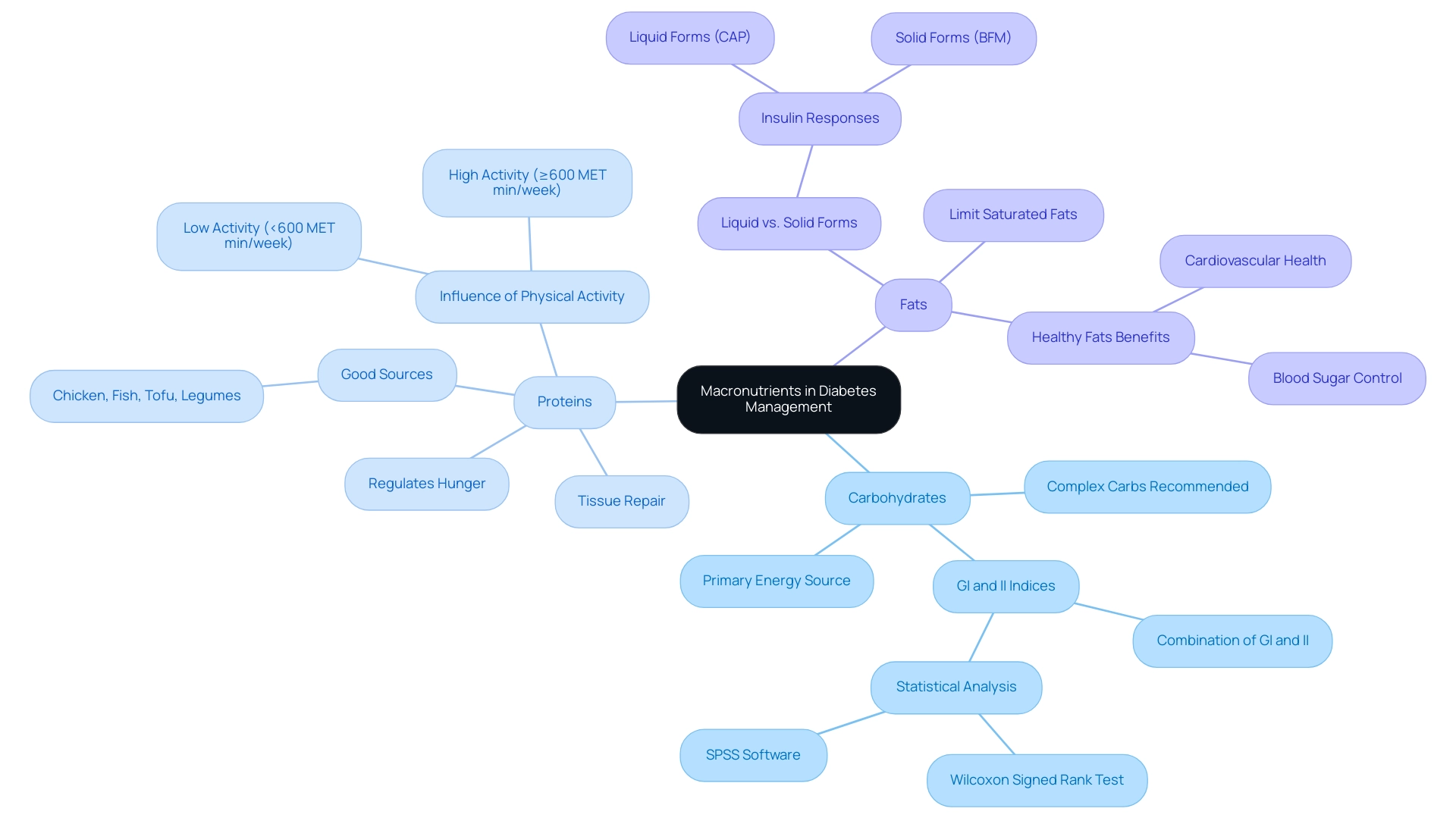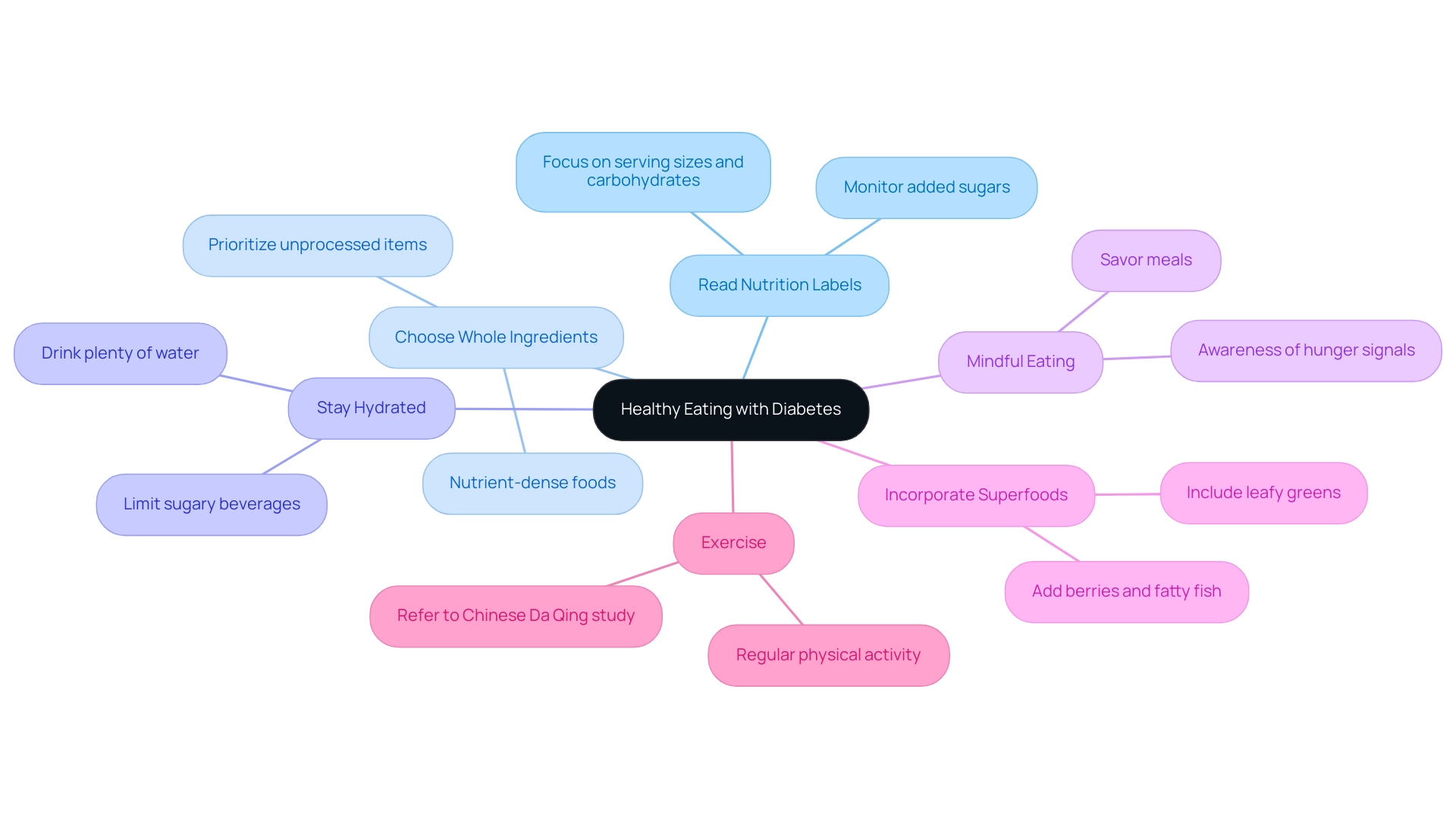Overview
The article provides a comprehensive overview of ADA nutrition principles essential for effective diabetes management, emphasizing the importance of personalized meal planning, carbohydrate counting, and understanding macronutrient roles. It supports this by detailing strategies such as prioritizing whole foods, practicing portion control, and staying hydrated, which collectively contribute to better blood sugar control and improved overall health outcomes for individuals managing diabetes.
Introduction
Navigating the complexities of diabetes management requires a solid understanding of nutrition and its impact on health. As individuals face the challenges associated with this condition, resources like T2DSolutions emerge as vital allies, offering education and community support tailored to the needs of those newly diagnosed.
Central to effective diabetes management is the practice of making informed dietary choices, including:
- Carbohydrate counting
- Understanding the glycemic index
By prioritizing whole foods and adopting balanced meal planning strategies, individuals can significantly enhance their blood sugar control and overall well-being.
This article delves into essential nutrition fundamentals, practical tips for healthy eating, and the latest guidelines from the American Diabetes Association, providing a comprehensive framework for those seeking to improve their diabetes management journey.
Fundamentals of Nutrition for Diabetes Management
Effective control of blood sugar levels relies heavily on nutritional selections, and T2DSolutions is dedicated to empowering individuals through thorough education and community assistance. As a new resource hub, T2 Solutions offers innovative tools and personalized community initiatives designed to assist newly diagnosed patients in their health management journey. Central to this approach is the practice of carbohydrate counting, which allows individuals to monitor their intake and make informed decisions about their meals.
Understanding the glycemic index is equally crucial, as it helps in recognizing how different items affect blood sugar levels. It is advisable for individuals with blood sugar management issues to prioritize whole foods, including an array of vegetables, whole grains, lean proteins, and healthy fats, while minimizing processed foods that are often high in sugars and unhealthy fats. As the National Kidney Foundation recommends, individuals with high blood sugar and stages 1–4 chronic kidney disease should aim for a protein intake of 0.8 g protein/kg of desirable body weight, highlighting the importance of tailored nutritional choices.
This balanced dietary approach not only contributes to improved blood sugar control but also fosters overall health and well-being. Recent studies emphasize that following these nutritional guidelines can result in improved health outcomes. Additionally, as highlighted by Dr. Kevin D. Huffman, a board-certified bariatric physician, 'Nutrition plays a foundational role in the control of blood sugar levels, influencing both immediate and long-term health metrics.'
By intentionally choosing nutrient-rich foods, individuals can greatly improve their quality of life while dealing with the intricacies of health conditions. Furthermore, the case study on alcohol consumption recommendations for those with blood sugar issues illustrates the risks linked to dietary choices, especially regarding hypoglycemia and weight control. Education on these risks is crucial for individuals with this condition to prevent adverse health effects.
T2DSolutions stands ready to support this journey with innovative resources and a dedicated community, ensuring that individuals have the tools they need for effective management of their condition.

Effective Meal Planning Strategies for Diabetes Control
To effectively manage diabetes, incorporating these meal planning strategies is essential:
-
Portion Control: Utilize measuring cups or a food scale to ensure proper serving sizes. Research indicates that maintaining portion control is fundamental for managing glucose levels.
-
Diabetes Plate Method: This method advises filling half your plate with non-starchy vegetables, one quarter with lean protein, and the remaining quarter with whole grains, aligning with the seven recognized meal patterns suggested for individuals with this condition.
-
Plan Ahead: Preparing meals in advance can help avoid last-minute unhealthy choices, ensuring adherence to dietary guidelines. A recent randomized control trial highlighted the benefits of structured meal planning using portioned meal boxes in optimizing blood glucose control in patients with type 2 metabolic disorder.
-
Incorporate Variety: Include a diverse range of food groups to provide balanced nutrition and combat meal fatigue, which is crucial for long-term dietary adherence.
-
Snack Wisely: Opt for healthy snacks such as nuts, yogurt, or fresh fruit to manage hunger effectively between meals.
The World Health Organization also emphasizes the importance of making informed choices regarding snack options, recommending minimized intake of trans fats to less than 1% of total energy intake. As T2D Solutions launches as a comprehensive resource hub for Type 2 and Type 3 blood sugar conditions education and community support, it will provide access to ADA nutrition resources, registered dietitians, meal planning tools, and personalized resources to empower newly diagnosed patients in their journey towards improved health oversight. These strategies aim to enhance dietary adherence and overall well-being.
Furthermore, research like the Diabetes Control and Complications Trial (DCCT) shows that personalized advice from registered dietitians greatly enhances long-term results for controlling blood sugar. By applying these strategies, individuals can greatly enhance their health control and overall well-being.

Understanding the Role of Macronutrients in Diabetes
Comprehending how each macronutrient affects sugar levels is crucial for effective diabetes management, particularly for individuals who are newly diagnosed, especially when considering ADA nutrition. Here’s a breakdown of how these nutrients affect your health:
-
Carbohydrates: As the primary source of energy, carbohydrates exert the most substantial effect on glucose levels. It is advisable to prioritize complex carbohydrates, such as whole grains and legumes, as recommended by ADA nutrition, since they digest more slowly and help stabilize sugar levels. Recent findings indicate that a combination of glycemic index (GI) values with other indices, such as the insulin index (II), could better inform the selection of healthier options, as highlighted by Shila Shafaeizadeh. Furthermore, statistical analyses, including the Wilcoxon signed rank test, were performed to evaluate differences in glycemic responses, providing a robust framework for understanding these effects.
-
Proteins: These macronutrients are vital for tissue repair and growth, and they can play a significant role in regulating hunger and glucose levels when consumed alongside carbohydrates. Good sources of protein, including chicken, fish, tofu, and legumes, can be complemented by ADA nutrition. The statistical analysis from a recent study demonstrated that the glycemic response can vary significantly based on the composition of nutrients, highlighting the importance of ADA nutrition, particularly protein, in managing diabetes. Notably, the study also considered physical activity levels, defining low activity as <600 MET min/week and high activity as ≥600 MET min/week, which can influence these responses.
-
Fats: Healthy fats, present in items such as avocados, nuts, and olive oil, are beneficial for cardiovascular health and may also assist in controlling blood sugar levels, which aligns with the principles of ADA nutrition. It is important to limit saturated and trans fats, which are associated with increased cardiovascular risk. A case study revealed that liquid forms, such as those containing healthy fats, resulted in significantly lower insulin responses compared to solid items, with insulin responses peaking at different times for each form. This highlights the relevance of food form in glycemic management. For more information on how to effectively manage this condition through ADA nutrition, be sure to explore T2D solutions, your comprehensive resource for Type 2 and Type 3 education and community support.

Practical Tips for Healthy Eating with Diabetes
At T 2 Solutions, we are dedicated to empowering individuals handling blood sugar conditions through education and community support. Adopting practical strategies for healthy eating is crucial. Here are several key recommendations:
-
Read Nutrition Labels: It is essential to scrutinize nutrition labels carefully. Focus on serving sizes, total carbohydrates, and added sugars, as these elements significantly influence blood sugar levels. Statistics indicate that participants diagnosed with diabetes have a weighted mean Dietary Inflammatory Index (DII) score of 1.67 (95% CI: 1.56, 1.77), underscoring the need for informed dietary choices.
-
Choose Whole Ingredients: Prioritize unprocessed items that are nutrient-dense and low in added sugars. Whole foods not only supply essential nutrients but also assist in maintaining stable glucose levels.
-
Stay Hydrated: Sufficient hydration plays a vital role in managing blood sugar levels. Drinking plenty of water and limiting sugary beverages can enhance overall health and assist in blood sugar control.
-
Mindful Eating: Engaging in mindful eating practices—such as taking the time to savor meals—can help prevent overeating and promote better digestion. This approach promotes awareness of hunger signals and portion sizes, which is essential for managing blood sugar levels effectively.
-
Incorporate Superfoods: Include superfoods known for their health benefits, such as leafy greens, berries, and fatty fish. These foods are not only rich in nutrients but also contribute to improved health outcomes.
-
Exercise: Complementing dietary strategies with regular physical activity is important. For example, the Chinese Da Qing study demonstrated a 47% reduction in T2D risk in physical activity clinics, emphasizing the significance of exercise in preventing this condition.
By implementing these tips, individuals can enhance their approach to ada nutrition and better manage their condition. As Aro A. states, 'Informed dietary choices are crucial for effective control of diabetes-related conditions.' Additionally, T2DSolutions will provide ongoing resources and community support to help you on your journey.

Latest ADA Nutrition Guidelines for Diabetes Management
At T2DSolutions, we acknowledge the critical importance of ada nutrition in managing Type 2 and Type 3 conditions. The most recent guidelines from the American Diabetes Association (ADA) emphasize the vital role of ada nutrition through individualized meal planning that is tailored to personal preferences, cultural backgrounds, and specific health objectives. This personalized approach is essential for effective diabetes management.
The guidelines emphasize the significance of tracking carbohydrate intake and comprehending the various types of carbohydrates consumed, as these factors greatly influence glucose levels. We encourage a diet rich in plant-based foods, lean proteins, and healthy fats while advising a reduction in processed and refined food consumption. Incorporating regular physical activity is also vital for maintaining blood sugar control and overall health.
Ongoing education and assistance are highlighted, enabling individuals to take control of their health care effectively. Significantly, Recommendation 14.53 suggests a minimum 7–10% decrease in excess weight for young individuals experiencing overweight and obesity with type 2, emphasizing the significance of weight control in this group. This recommendation is crucial as achieving this weight loss can significantly improve glycemic control.
The Ada's updates, including the recent advocacy statement on 'Care of Young Children With Diabetes in the Childcare and Community Setting,' reflect their commitment to evolving ada nutrition guidelines in response to the needs of patients. Additionally, the American Diabetes Association Professional Practice Committee emphasizes the importance of setting glycemic goals for critically ill individuals, recommending a target glucose range of 140–180 mg/dL (7.8–10.0 mmol/L). Td Solutions aims to be your comprehensive resource for understanding and applying these guidelines.
We will offer detailed meal plans, educational articles, and community forums where individuals can share experiences and support one another. Our cooking classes will allow participants to learn how to prepare healthy meals under the guidance of nutrition experts, demonstrating how individualized meal planning can be effectively implemented. Testimonials from participants will showcase how these resources have positively impacted their diabetes management.
![]()
Conclusion
Understanding and managing diabetes effectively requires a solid foundation in nutrition and meal planning strategies. The article highlights the critical role of informed dietary choices, emphasizing carbohydrate counting and the glycemic index as essential tools for individuals navigating this complex condition. By prioritizing whole foods and adopting balanced meal planning techniques, individuals can significantly improve their blood sugar control and overall health.
Incorporating practical tips, such as:
- Portion control
- Mindful eating
- The Diabetes Plate Method
further reinforces the importance of structured meal planning. These strategies not only help in managing diabetes but also enhance long-term adherence to healthy eating patterns. Moreover, understanding the roles of macronutrients—carbohydrates, proteins, and fats—provides essential insights that enable individuals to make informed decisions about their diets.
The latest guidelines from the American Diabetes Association underscore the necessity of personalized meal planning tailored to individual needs and cultural preferences. By embracing a holistic approach to nutrition that includes education, community support, and practical resources, individuals can empower themselves in their diabetes management journey.
Ultimately, the path to effective diabetes management lies in the commitment to informed choices and continuous learning. Resources like T2DSolutions offer invaluable support, ensuring that individuals have the tools and knowledge necessary to navigate their health challenges successfully. Prioritizing nutrition is not just about managing diabetes; it is about enhancing overall quality of life and achieving a sustainable, healthy future.



